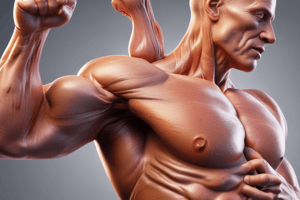Podcast
Questions and Answers
Which type of contracture is caused by immobilization and does not involve tissue pathology?
Which type of contracture is caused by immobilization and does not involve tissue pathology?
- Fibrotic contracture
- Myostatic contracture (correct)
- Pseudomyostatic contracture
- Arthrogenic contracture
Which type of contracture is associated with hypertonicity and limited range of motion due to a central nervous system lesion?
Which type of contracture is associated with hypertonicity and limited range of motion due to a central nervous system lesion?
- Myostatic contracture
- Fibrotic contracture
- Pseudomyostatic contracture (correct)
- Arthrogenic contracture
Which type of contracture is the result of intra-articular pathology, such as adhesions or synovial proliferation?
Which type of contracture is the result of intra-articular pathology, such as adhesions or synovial proliferation?
- Pseudomyostatic contracture
- Arthrogenic contracture (correct)
- Fibrotic contracture
- Myostatic contracture
Which type of contracture develops when connective tissues that cross or attach to a joint lose mobility, restricting normal arthrokinematic motion?
Which type of contracture develops when connective tissues that cross or attach to a joint lose mobility, restricting normal arthrokinematic motion?
Which type of contracture is characterized by a large amount of nonextensible, fibrotic adhesions and scar tissue, and can occur after long periods of immobilization or tissue trauma?
Which type of contracture is characterized by a large amount of nonextensible, fibrotic adhesions and scar tissue, and can occur after long periods of immobilization or tissue trauma?
Flashcards are hidden until you start studying




